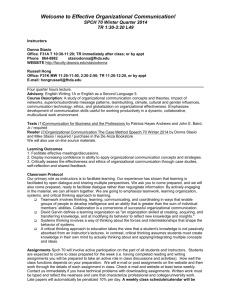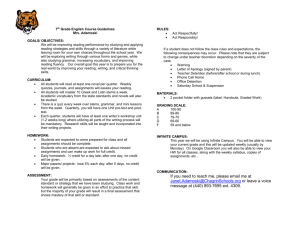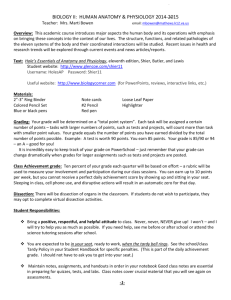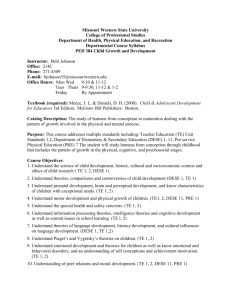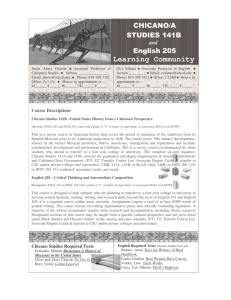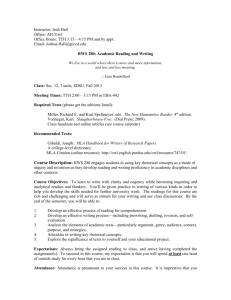Welcome to Effective Organizational Communication!
advertisement
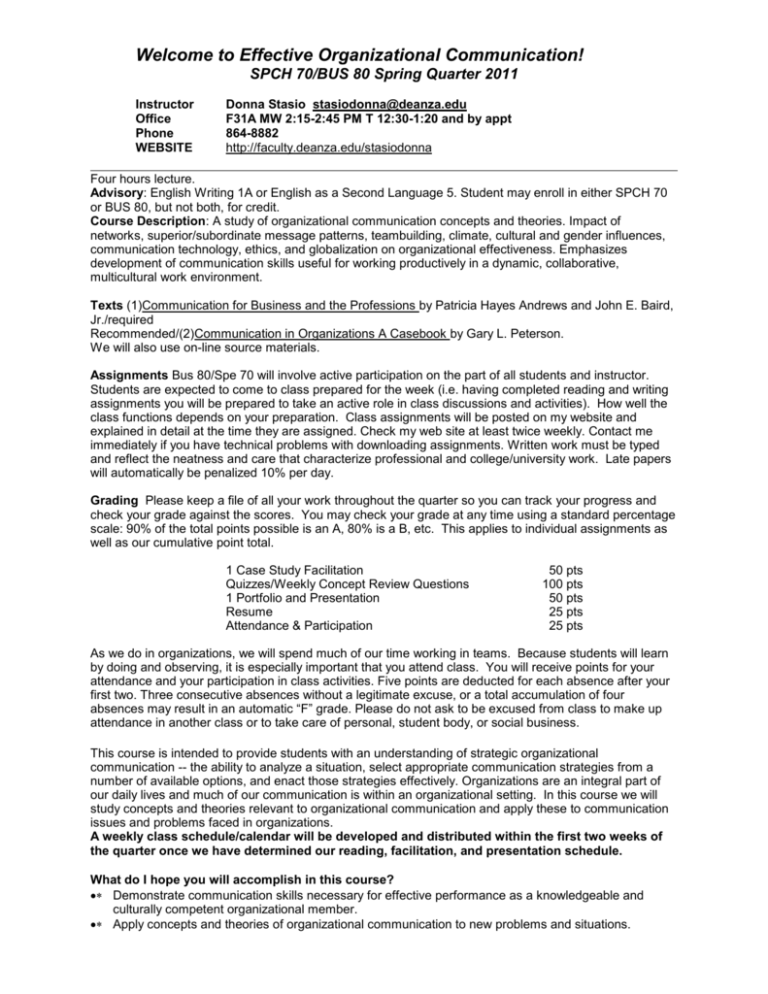
Welcome to Effective Organizational Communication! SPCH 70/BUS 80 Spring Quarter 2011 Instructor Office Phone WEBSITE Donna Stasio stasiodonna@deanza.edu F31A MW 2:15-2:45 PM T 12:30-1:20 and by appt 864-8882 http://faculty.deanza.edu/stasiodonna Four hours lecture. Advisory: English Writing 1A or English as a Second Language 5. Student may enroll in either SPCH 70 or BUS 80, but not both, for credit. Course Description: A study of organizational communication concepts and theories. Impact of networks, superior/subordinate message patterns, teambuilding, climate, cultural and gender influences, communication technology, ethics, and globalization on organizational effectiveness. Emphasizes development of communication skills useful for working productively in a dynamic, collaborative, multicultural work environment. Texts (1)Communication for Business and the Professions by Patricia Hayes Andrews and John E. Baird, Jr./required Recommended/(2)Communication in Organizations A Casebook by Gary L. Peterson. We will also use on-line source materials. Assignments Bus 80/Spe 70 will involve active participation on the part of all students and instructor. Students are expected to come to class prepared for the week (i.e. having completed reading and writing assignments you will be prepared to take an active role in class discussions and activities). How well the class functions depends on your preparation. Class assignments will be posted on my website and explained in detail at the time they are assigned. Check my web site at least twice weekly. Contact me immediately if you have technical problems with downloading assignments. Written work must be typed and reflect the neatness and care that characterize professional and college/university work. Late papers will automatically be penalized 10% per day. Grading Please keep a file of all your work throughout the quarter so you can track your progress and check your grade against the scores. You may check your grade at any time using a standard percentage scale: 90% of the total points possible is an A, 80% is a B, etc. This applies to individual assignments as well as our cumulative point total. 1 Case Study Facilitation Quizzes/Weekly Concept Review Questions 1 Portfolio and Presentation Resume Attendance & Participation 50 pts 100 pts 50 pts 25 pts 25 pts As we do in organizations, we will spend much of our time working in teams. Because students will learn by doing and observing, it is especially important that you attend class. You will receive points for your attendance and your participation in class activities. Five points are deducted for each absence after your first two. Three consecutive absences without a legitimate excuse, or a total accumulation of four absences may result in an automatic “F” grade. Please do not ask to be excused from class to make up attendance in another class or to take care of personal, student body, or social business. This course is intended to provide students with an understanding of strategic organizational communication -- the ability to analyze a situation, select appropriate communication strategies from a number of available options, and enact those strategies effectively. Organizations are an integral part of our daily lives and much of our communication is within an organizational setting. In this course we will study concepts and theories relevant to organizational communication and apply these to communication issues and problems faced in organizations. A weekly class schedule/calendar will be developed and distributed within the first two weeks of the quarter once we have determined our reading, facilitation, and presentation schedule. What do I hope you will accomplish in this course? Demonstrate communication skills necessary for effective performance as a knowledgeable and culturally competent organizational member. Apply concepts and theories of organizational communication to new problems and situations. Learn to critique, evaluate, and manage methods, problems and strategies central to effective organizational communication through case study analysis. Discuss the importance of ethics for organizations and assess how communication both shapes and reflects an organization’s ethical standards. Improve ability to work productively in a collaborative environment. Improve ability to participate productively in group meetings and facilitate meetings. Develop communication skills used to foster productive interpersonal and group relationships within organizations. Assess, apply and evaluate appropriate types of listening behavior in a variety of organizational situations. Examine verbal behaviors that commonly produce defensive, aggressive, and supportive reactions. Examine types and influences of non-verbal communication in a variety of situations. Discuss appropriate and inappropriate communication for a job interview. Evaluate and apply techniques and methods for managing differences and conflicts. Improve writing, presentation, and self evaluation skills. Examine specific theoretical perspectives and organizational practices in both domestic and global contexts relating to organizational communication. Compare diverse organizational philosophies and implications for communication. Assess how communication relates to success of and within organizations. Discuss the concept of corporate culture and how it is reflected in organizational communication practices. Evaluate how ethics, gender, and cultural values and beliefs influence organizational communication processes and outcomes. Evaluate appropriate and inappropriate computer mediated communication (CMC) in a variety of organizational situations. (*Included in official course outline) What guidelines will help you meet these goals? Students will prepare original case evaluations, written documents and presentations/facilitations that demonstrate a clear understanding of the concepts and theories of organizational communication. Assignments should --emphasize the context of organizational communication -explicitly integrate text and related research materials -include relevant examples -engage and involve the audience or other team members when appropriate What writing assignments will help you meet these goals? Case Analyses Concept Review Questions Resume Portfolio Students earning higher grades in this course tend to actively and thoughtfully participate in discussions, start assignments early so they can ask any questions for clarification, and have a desire to learn more about organizational communication. Spring Quarter Dates Apr 16 Last day to add May 27 Last Day to drop w/”W” May 30 Memorial Day Holiday/No Class June 21-24 Finals Week Final Grades A+250-245 A244-234 A-233-225 B+224-220 B219-210 B-209-200 C+199-195 C194-175 D+174-170 D169-160 D-159-150 F Less than 150




